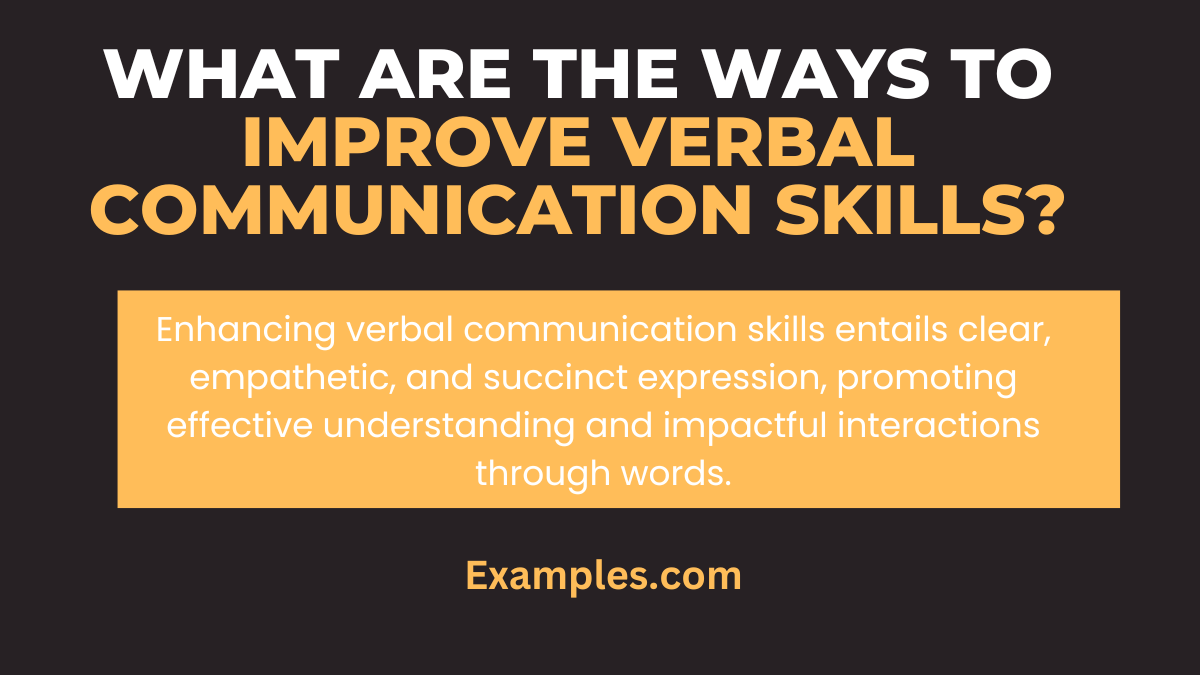Ways to Improve Verbal Communication Skills – Examples
Unlock the secrets of eloquence with this complete guide on ways to improve verbal communication skills, packed with practical tips and compelling Communication Examples. Enhance your dialogue and make every conversation count, whether in personal interactions or professional settings. Learn to express yourself clearly and effectively, understanding the nuances of tone, pace, and empathy to truly connect with your audience.
Download Ways to Improve Verbal Communication Skills for Students
What are the Ways to Improve Verbal Communication Skills? – Meaning

Improving verbal communication skills means enhancing the ability to convey thoughts, feelings, and information effectively through spoken words. It involves clarity, succinctness, empathy, and active listening to ensure your message is understood as intended. This guide explores various methods and Verbal Communication Examples to help you refine your speaking abilities, making your interactions more impactful and rewarding.
Ways to Improve Verbal Communication Skills in the Workplace
Enhance your professional interactions with key techniques to improve verbal communication skills in the workplace. This guide focuses on how better speaking and listening can significantly boost collaboration, productivity, and understanding in any professional setting, addressing core aspects of Verbal Communication in the Workplace, Verbal Communication in Business and Verbal Communication in Healthcare.
- Structured Meetings: Organize thoughts and agendas clearly for efficiency. “Let’s address each topic with a time limit to ensure thorough discussion.”
- Feedback Culture: Encourage open, constructive feedback for continuous improvement. “I value your perspective; how can we enhance this project together?”
- Clear Instructions: Convey tasks and expectations with clarity and detail. “Please complete the report by Tuesday, focusing on the financial analysis section.”
- Active Listening: Show engagement and understanding in conversations. “I hear your concern about deadlines, let’s discuss how to manage this.”
- Empathy in Communication: Understand and acknowledge the feelings of coworkers. “I understand this is challenging, let’s find a solution together.”
Ways to Improve Verbal Communication Skills in the Classroom
Discover effective strategies for teachers and students to enhance verbal communication in educational settings. This guide delves into practical ways to foster a more engaging, understanding, and dynamic classroom environment, tapping into Verbal Communication for Teachers, Students, and School settings.
- Encouraging Participation: Create an inclusive atmosphere for students to share ideas. “I’d love to hear thoughts from everyone on this topic, let’s go around the room.”
- Clear Lesson Objectives: Start each class with clear, concise goals. “Today’s objective is to understand the causes of the Civil War. Let’s explore these together.”
- Feedback Sessions: Provide personalized, constructive feedback to students. “Your essay was well-structured; incorporating more sources could strengthen your argument.”
- Group Discussions: Facilitate group activities to enhance collaborative communication. “Let’s break into groups and discuss the main themes of the book.”
- Addressing Different Needs: Adapt communication to cater to diverse learning styles and needs, including Verbal Communication for Autism. “I will provide written summaries for those who prefer reading to auditory learning.”
How Can Technology Be Utilized to Improve Verbal Communication Skills?
Incorporating technology offers innovative ways to enhance Verbal Communication Skills, capitalizing on tools and platforms that facilitate learning and interaction.
- Virtual Meetings & Webinars: Use these to practice speaking and presentation skills in diverse settings.
- Speech Recognition Software: Improve pronunciation and fluency by getting immediate feedback from these applications.
- Communication Apps: Engage in real-time conversations with people around the world to practice adaptability and clarity.
- Podcasting & Recording Tools: Record and listen to your speech for self-analysis and improvement.
- Online Courses & Tutorials: Enroll in courses specifically designed to enhance verbal communication skills and Verbal Communication Techniques.
What Strategies Can Employ to Develop and Refine Their Verbal Communication Skills?
Developing and refining verbal communication skills is essential for effective interaction. Here are strategies to cultivate these skills, understanding the Functions of Verbal Communication and its impact.
- Regular Practice: Engage in conversations regularly to build confidence and clarity.
- Feedback Mechanism: Seek and provide feedback to understand the Effective Communication and areas of improvement.
- Role-Playing: Simulate various scenarios to adapt your Communication Style to different situations.
- Mindful Listening: Focus on active listening to understand the context and respond appropriately.
- Study Communication Models: Understand the Types of Verbal Communication and apply different models to improve your interactions.
What are Creative Ways to Improve Verbal Communication Skills for Children and Adolescents?
Enhancing communication skills in young individuals can be both fun and educational, fostering lifelong effective verbal interactions. Incorporating these methods can significantly contribute to the Advantages and Disadvantages of Verbal Communication and understanding of verbal vs written communication, as well as verbal vs oral communication, providing a comprehensive understanding and improvement of ways to improve verbal communication skills. Each strategy is designed to address the dynamic needs and preferences of individuals, leveraging traditional methods and modern technology to enhance the quality and effectiveness of verbal interactions.
- Storytelling & Role Play: Encourage children to tell stories or act out scenarios, helping them articulate thoughts creatively.
- Debate Clubs & Public Speaking: Participate in groups that encourage structured and impromptu speaking, promoting confidence and clarity.
- Interactive Games: Use board games and group activities that require discussing strategies or rules, enhancing verbal articulation.
- Peer Communication Exercises: Pair up with friends or classmates to practice conversations, interviews, or storytelling.
- Technology Aids: Utilize apps and games designed to improve vocabulary, pronunciation, and fluency in a fun, engaging way.
What are Effective Ways to Improve Verbal Communication Skills during Presentations?
Focus on clarity, practice frequently, and engage with your audience to improve presentation skills, showcasing the importance of verbal communication in public speaking.
What are the Key Ways to Improve Verbal Communication Skills in Personal Relationships?
Listen actively, express empathy, and provide clear feedback to enhance understanding and connection, reflecting why you need verbal communication skills in relationships.
How Can Educators Incorporate Ways to Improve Verbal Communication Skills in Their Teaching Methods?
Educators can foster discussions, provide constructive feedback, and model effective communication, adhering to the rules of verbal communication to enhance student learning.
In conclusion, improving verbal communication skills is vital for personal and professional growth. By understanding its effects, recognizing the signs of poor communication, and employing strategies to enhance dialogue, individuals can foster more effective, empathetic, and productive interactions. Embrace these practices to navigate conversations successfully and positively influence your communicative encounters.



